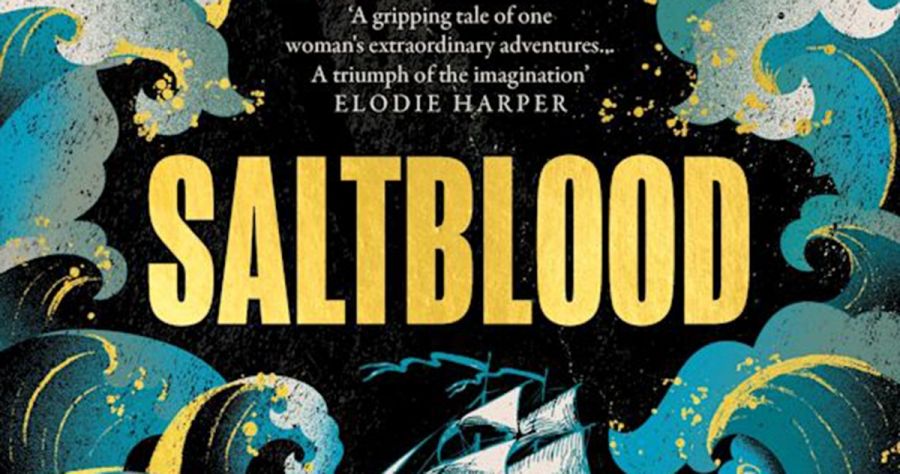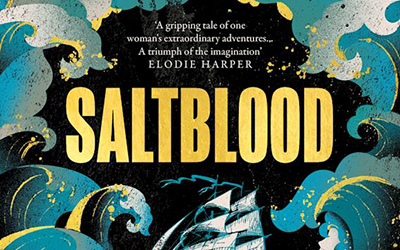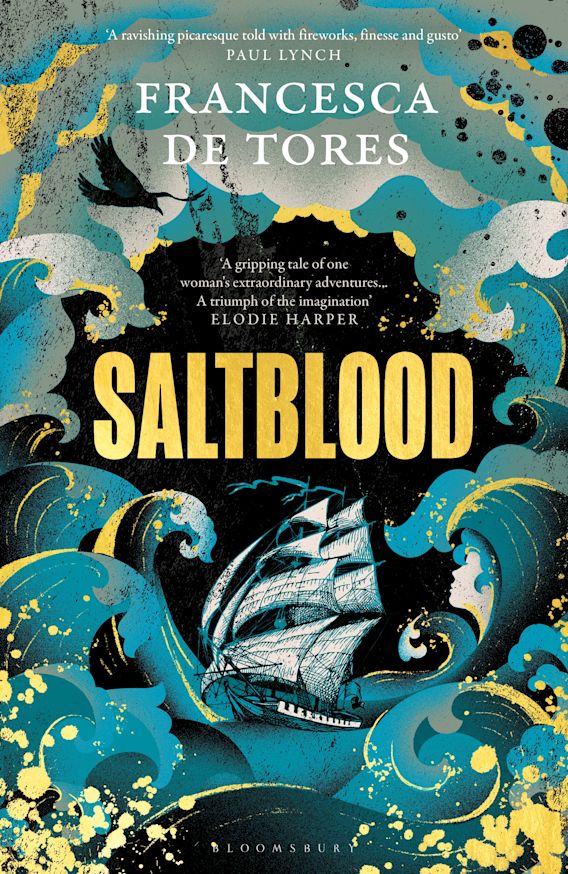
- Free Article: No
- Contents Category: Fiction
- Review Article: Yes
- Article Title: Republics of salt
- Article Subtitle: A haunting new novel of the sea
- Online Only: No
- Custom Highlight Text:
Tell me your crow name. Tell me the name you will wear to the bottom of the sea,’ begins the narrating voice of Francesca de Tores’s new novel, Saltblood. These opening words, spoken by the central character at what we come to realise is the end of her life, highlight the novel’s key themes and imagery: the play of names and identities, sometimes given and sometimes taken, but always something to be worn or cast off; the call of the sea and its persistent presence of sparkle and depth throughout this chronicle of an unusual life; and the blue-black image of the crow itself, the speaker’s constant familiar, an intimate figure who lurks, ominous and comforting, in the sway of rigging. Unfolding her story in the shadow of imminent death, the reflective, determined voice of de Tores’s narrator is as deep and unpredictable as the ocean itself, thereby setting the stage for a story of introspection and observation, resilience and desire, swashbuckling action, and quotidian seaboard life.
- Featured Image (400px * 250px):

- Alt Tag (Featured Image): Rose Lucas reviews ‘Saltblood’ by Francesca de Tores
- Book 1 Title: Saltblood
- Book 1 Biblio: Bloomsbury, $32.99 pb, 344 pp
- Book 1 Cover Small (400 x 600):

- Book 1 Cover (800 x 1200):

Saltblood is historical fiction which achieves that rare combination of being both a gripping read and intellectually and emotionally nuanced. Through the observing lens of its narrator, the novel evokes the often chaotic and violent world of early 1700s seafaring, war, and the so-called ‘golden age of pirating’, from the Mediterranean to Nassau in the Bahamas, the mythical heart of a ‘Republic of Pirates’. It is an exotic but often desperate world, which, for many of its inhabitants, generates fantasies of living beyond the pale, outside the class and gender conventions of the time. De Tores’s perspective in this world-building is distinctly modern, particularly in the construction of the narrator, Mary, whose gender motility speaks to contemporary notions of performativity and even drag/trans identifications. What does it mean to have a biologically female body and to dress and act as a boy and also to marry and give birth, to desire where love arises rather than where convention dictates?
Mary – sometimes Mark – Read was, as the author tells us, a documented figure in the annals of piracy, although these records are thin and require the imagination of the novelist to animate them. Raised as a boy in order to secure a grandparent’s legacy to her dead brother, de Tores’s Mary/Mark inhabits a shifting world, where appearance and biology are not always aligned, and where ‘Mary’ is forever stalked by the ghost of Mark, by the need to maintain the disguise of another’s identity. As Mark emerges from Ma’s strategic machinations, he enters service as a footman, hiding his menstrual rags, before leaving to join the navy. It is here, working hard as an apparently pre-pubescent ‘powder monkey’ and climbing the masts, that Mark discovers a great love of the sea – its beauty and mutability, danger and indifference, providing opportunities for certain kinds of freedom. A strong and agile body, quick learning of the skills of seafaring, and a head for heights protect Mark from most discerning gazes before he is eventually ‘outed’ and forced to leave the ship and head for the army. It is during this period, which he describes as ‘coming into the season of my longings’, that passions are stirred with his tent companion; in a manner reminiscent of Ursula K. Le Guin’s The Left Hand of Darkness, Mark becomes/emerges as Mary and for a brief time lives as a Flanders wife.
Unshackled from the masquerade of pretending to be only Mark, Mary Read returns to the seafaring life, hoisting her skirts around her so that she can still climb the masts and work as hard as any man within the organism of a ship’s crew. It is in this indeterminate space between expectations that Mary spends her adult life, inhabiting the paradoxical opportunities which her unfixed self and names allow her: she is recognised as ‘not man’, yet she is not constrained by any traditional idea of ‘woman’ either, neither Captain’s wife nor the provider of sexual services to the male crew. When her heart and body yearn for the wild Anne Bonney, another paradigm of identity and desire is unstitched and re-woven into something that is beautiful, a compelling experience of body and emotion. Perhaps the great progression in the novel, and what makes it ultimately a Bildungsroman, is that, despite the traumas she experiences, Mary grows to be comfortable in the varying roles given to her. The ‘self’ she comes to inhabit is both Mark and Mary and yet it is also more complex than any simple binary might suggest. Like the tale that Mark hears as a lad of the selkie who encompasses both woman and seal, sea and land, human and creature, Read revels in diversity, evolving and adapting to the variabilities of circumstance, like a sail in the wind.
De Tores is a poet as well as the author of four previous novels (publishing as Francesca Haig). The richness of language in Saltblood, the almost Turneresque suggestions of water, sky, the roiling and the ‘singing’ of the wooden boats, as well as the ability to voice Read’s interiority – all demonstrate the skill of a poetic sensibility and craft. Saltblood is a rollicking read, a compelling picaresque of journey and challenge and change. Through this narrative of Mary/Mark Read, it also offers intelligent and moving insights into the always complex business of life, examining how we might find or make ourselves – or indeed be made by others – and yet still build hopeful ‘republics of salt’, as Mary puts it, with the surprising material of our own particular.


Comments powered by CComment